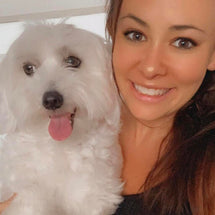Caring for Your Dog in Their Senior Years

As our beloved dogs age, they continue to bring joy, love, and comfort to our lives. However, as they age, they require additional care and attention to ensure they remain happy, healthy, and comfortable. Just like us, dogs experience changes in their bodies and minds as they grow older, and understanding these changes is key to providing them with the best quality of life in their senior years.
When Do Dogs Become Seniors?
The age at which a dog becomes a senior varies based on breed and size. In general:
- Small Breeds: Dogs that weigh under 10 kilograms typically become seniors around 10-12 years old.
- Medium to Large Breeds: Dogs that weigh between 10-22 kilograms usually enter their senior years around 8-10 years old.
- Giant Breeds: Larger dogs, like Great Danes or Saint Bernard's, age more quickly and may be considered seniors by 6-7 years old.
No matter their size or breed, once your dog reaches their senior years, their care needs will shift.

Signs of Aging in Dogs
As dogs age, they may show certain physical and behavioural changes. These can vary depending on the dog, but common signs of aging include:
-
Slower Movement: Your dog may move more slowly or seem less interested in exercise due to joint pain or stiffness.
-
Changes in Appetite: Senior dogs may experience a decrease in appetite or may become pickier with their food.
-
Difficulty Seeing or Hearing: Older dogs might have trouble seeing in low light or hearing high-pitched sounds.
-
Cognitive Decline: Similar to dementia in humans, dogs can experience cognitive dysfunction syndrome (CDS), which can cause confusion, anxiety, and disrupted sleeping patterns.
-
Dental Issues: Dental disease is common in senior dogs, leading to bad breath, difficulty eating, or mouth pain.
- Increased Sleeping: Senior dogs often sleep more and may be less energetic during the day and can sleep up to 18 hours+ per day!
Recognizing these signs early can help you adjust their care routine to ensure they remain comfortable and healthy.

Top 10 Tips to Care for Your Senior Dog
Regular Vet Check-ups
Senior dogs should see the vet at least twice a year. Regular check-ups help catch age-related issues like arthritis, heart disease, kidney problems, and cognitive dysfunction early on. Your vet may also recommend specific tests or screenings to monitor your dog’s health.
Provide a Comfortable Bed
Older dogs can develop joint pain or arthritis, so a comfortable, supportive bed is essential. Orthopaedic beds are designed to relieve pressure on sore joints and provide better sleep for your senior dog.
Maintain a Healthy Diet
Senior dogs often have different nutritional needs. Look for dog food formulated using high quality proteins and nutrients like Omega-3 fatty acids, antioxidants, and joint-supporting ingredients like turmeric and green lipped mussels.
Adjust Exercise to Their Ability
While senior dogs may not have the stamina they once did, regular, low-impact exercise is still important to keep them healthy and active. Short walks, gentle playtime, or even swimming are great options for senior dogs. Be sure to monitor their energy levels and avoid overexertion.
Monitor Weight and Mobility
Senior dogs are at an increased risk of obesity, which can exacerbate joint issues. Keep an eye on your dog’s weight, and adjust their food portions or exercise routine if necessary. Additionally, if you notice signs of arthritis or stiffness, talk to your vet about joint supplements or pain management options.
Dental Care is Crucial
Dental disease is common in older dogs, so it’s important to brush their teeth regularly and schedule professional cleanings with your vet. Look for diets which include ingredients to support dental health like Ascophyllum nodosum which reduces plaque and tartar.
Provide Mental Stimulation
Senior dogs can benefit from mental exercises to keep their brains sharp. Puzzle toys, interactive games, and obedience training sessions are great ways to keep them engaged. Mental stimulation can also help combat cognitive decline and reduce anxiety.
Keep Their Environment Safe
As dogs age, they may become less agile, so making your home senior-friendly is important. Non-slip rugs, ramps, and steps can help them navigate stairs or get onto furniture with ease. Avoid letting them jump off high places to prevent injury.
Watch for Behaviour Changes
If your dog is experiencing cognitive dysfunction syndrome (CDS), they may become disoriented, anxious, or confused. Keep an eye on any behaviour changes, such as increased barking, pacing, or difficulty recognizing familiar faces or places. If you notice these signs, consult your vet for guidance on managing the condition.
Give Extra Love and Attention
Senior dogs often become more affectionate and may crave extra attention from their owners. Spending quality time together, whether it’s cuddling, playing, or just sitting in the same room can provide comfort and help strengthen your bond. Remember that your senior dog still wants to be part of the family, even if their energy levels have slowed down.

What Should I feed My Senior Dog
- High-Quality Protein: Supports muscle mass and is easy to digest. Look for sources like chicken, fish, or turkey.
- Moderate Calories (Approximately 325-450 kcal per cup of food): Helps prevent weight gain due to slower metabolisms and less activity.
- Joint Support : Includes glucosamine, chondroitin, and Omega-3s (at least 0.5%) for arthritis and mobility.
- Heart Health: Antioxidants and Omega-3s promote cardiovascular health, especially for prone breeds.
- Digestive Support (Fibre 3-5%): Fibre-rich foods (pumpkin, sweet potatoes) and probiotics improve digestion.
- Kidney Support: Lower phosphorus and sodium diets help manage kidney health.
- Immune Boost: Antioxidants like Vitamin C and beta-carotene strengthen immunity.

While your senior dog’s needs may change, the love, loyalty, and companionship they bring remain constant. With the right care and attention, your dog can continue to live a happy and comfortable life well into their golden years. Embrace the special bond you share with your senior dog, and make sure they have all the support they need to thrive.
After all, they’ve been there for you through thick and thin, and now it’s your turn to be there for them in their time of need.






